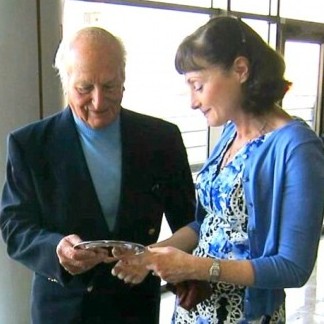
Lifestyle/Community

Bergen Belsen liberator relives horror
VANESSA VALKIN
It was at this camp where Anne Frank died just weeks before.
Berney, now 93, from Plymouth, Devon, addressed the media in Cape Town. He has for the past few years, been a resident of The World, the world’s largest private residential cruise ship. It is owned by its residents and continuously navigates the globe, stopping off every few days somewhere new.
South African Holocaust and Genocide Foundation Director Richard Freedman had heard about Berney and The World’s stopover in Cape Town, through a contact and organised the briefing.
Freedman’s contact, Elizabeth Kahn, 59, is the daughter of a Jewish classmate of Anne Frank, who unlike Frank survived till the camp was liberated and was rescued by Berney and his British 11th Armoured Division. He was with Lieutenant-Colonel Taylor, the commanding officer of the 63rd Anti-Tank Regiment, who was tasked with taking charge of Belsen camp.
Kahn’s mother, Nanette Blitz Konig, was mentioned in Anne Frank’s world-famous diary, and had acted as translator for Leonard in the camp. At the then 16-year-old Konig’s request, Berney sent a letter to her relatives in north London to tell them she was alive and he helped arrange her safe transport.
On April 15, 1945, Major Berney and his division, were accompanied by SS member and Commandant Joseph Kramer, known as The Beast of Belsen, who handed over control of Belsen and was later executed on war crime charges.
In the camp the unsuspecting soldiers were met by the horror of near-death prisoners and scattered corpses.
Berney, who has written his own memoir of the events, recounts: “I remember being completely shattered. There were dead bodies lying beside the road, emaciated men and women prisoners still mostly behind barbed wire, open mass graves containing hundreds of corpses.
“The sights, the stench, the sheer horror of the place, were indescribable. None of us who entered the camp that day had any warning of what we were about to see or had ever experienced anything remotely like it before.”
Berney became responsible for supplying fresh food, and clean water.
“Many of the inmates were starving, emaciated and suffering from typhus; they bolted down this rich mixture food and that sadly caused their deaths. It was estimated that 1 000 to 1 500 died because of the food we gave them.”
Berney was in charge of organising a makeshift 15 000 bed hospital to care for the people being evacuated from the camp which was burned down three weeks after their arrival.
While the Belgian, Dutch, French (and other Allied country) prisoners were swiftly repatriated, those from the Russian and Soviet occupied countries, Poland, Ukraine, Hungary, Yugoslavia, feared that as soon as they went home, they would be arrested and imprisoned again as “German collaborators and spies for the Allies”.
This was surprising for the British soldiers who thought that the inmates would want to leave as soon as possible. The British soldiers then realised they were “in for a long haul”. They organised a school for the children, and arranged concerts.
“With the enormous effort put in by our soldiers and the less ill of the former prisoners themselves, life was made at least tolerable for those poor people,” Berney says.
After the Western former prisoners had left, about 20 000 inmates, virtually all Jewish; were left as Displaced Persons, “DPs”, and the transit camp became the “Belsen DP Camp”.
The DPs hoped to immigrate to Britain, America, and Australia but things moved very slowly. The DPs soon realised their only salvation was to make their way to Palestine and groups would leave daily “for that very long and perilous journey”.
The DP camp was only finally dissolved five years later, by which time the DPS had scattered around the world though the largest group went to Palestine. By this time Berney was back in England and beginning to build his clothing manufacturing empire.
He says that in the early years, he wanted to forget about his war experiences but about 10 years ago, amid an atmosphere of Holocaust denial, he began to feel it was important to start telling his story – and this he does, with great eloquence and mental alacrity for a man of his age.
Berney who has been reported Jewish in the British Press, told the SA Jewish Report that he grew up in a non-religious home, and says that after what he witnessed in the war, his atheistic beliefs were confirmed.




